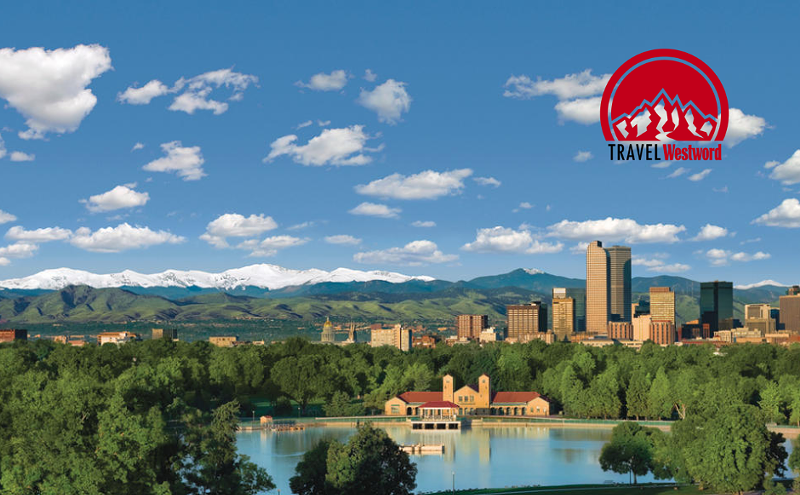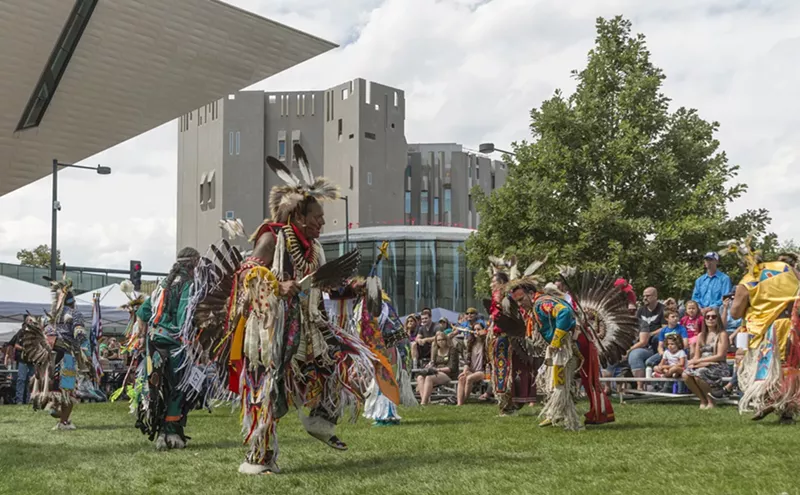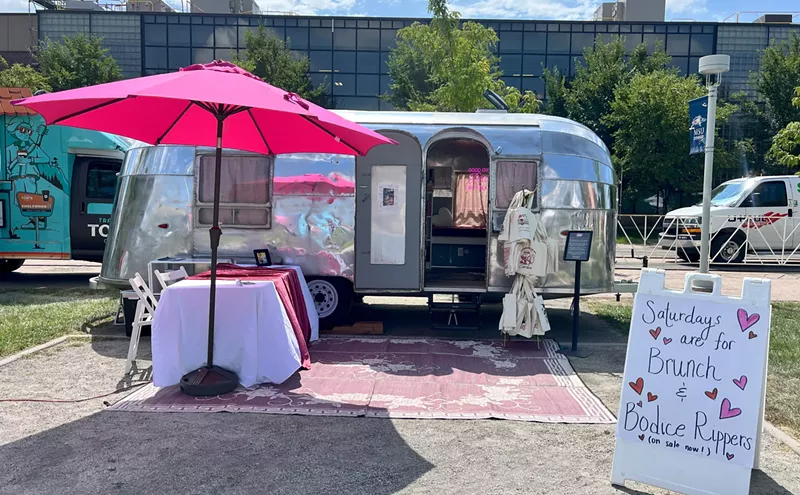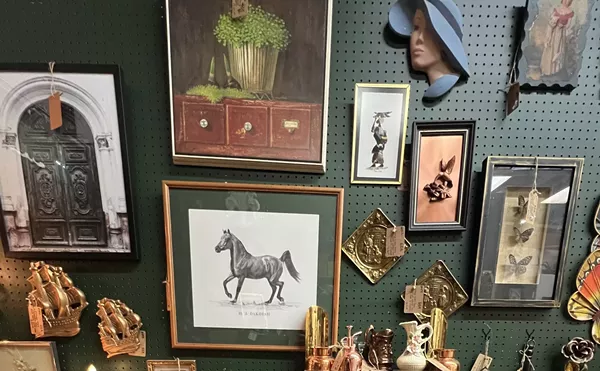Westword (A.H. Goldstein): Can you start out by giving a simple synopsis of Susannah for the non-opera crowd? Leigh Holman: It's based on an apocryphal story from the Bible called "Susannah and the Elders;" it's based on that, although it's set in the 1950s in the mountains of Tennessee. That happens to be where I'm from.
It's about a young woman, Susannah, who is a beautiful, free spirited girl. One day, she's bathing on her own property. Four elders from the church see her. They go back to town and spread rumors about her; the rumors grow and grow. It becomes almost a mob rule situation. Carlisle Floyd wrote this during McCarthyism. When somebody starts gossiping about somebody, everybody gets on the bandwagon. That's what the theme of the opera is about.
WW: So are there echoes of Arthur Miller's The Crucible? LH: In that sense, yeah. It's like a witch trial. Everybody in town starts gossiping about her. She is a virgin, but the family preacher comes by to save her soul because of the rumors that she's a loose woman. He ends up having his way with her. At the end of the opera, Susannah's brother Sam finds out what the preacher has done to her. Sam shoots the preacher, and the whole town comes with flashlights and torches to find Sam and Susannah -- by that time, she's gone completely crazy. She's standing on her front porch with her shotgun and she's laughing. She's completely lost her mind. Because of this mob rule, they took a beautiful, sweet, virginal girl and through gossip, they drove her to her wit's end.
WW: What was it about this piece that appealed to you? Why did you forego the traditional Italian or French pieces that always seem to make it into the regular seasons? LH: First of all, there are a couple of arias from the piece that are often done in auditions, when young people are singing. There are four very popular pieces -- "The Trees on the Mountain," "Ain't It a Pretty Night," those are two of Susannah's arias. The preacher has one and Sam has one that's a really popular tenor aria, too. When someone auditions with English arias, you hear them often. It makes people curious: What is the opera that all of these are from?
We decided last year to have an all-American season because, last year, we kicked off our CU New Opera Works program, which is promoting new, American opera. We had composers come in to work with our students, and we decided to do that again this summer. We decided to have an all-American season to introduce people to these classic American pieces. WW: You mentioned the fact that you're from Tennessee. Did that geographic connection play into the selection? LH: Susannah was very close to my heart, not only because of the music but because of the relevance it has to my own life, growing up in Tennessee. The opera takes place in and around an Evangelical church; the people in the church are the people who are actually turning on Susannah. I grew up in the Southern Baptist Church in Tennessee, so a lot of the story line I could really relate to. I just think it's a beautiful piece and it was appropriate for our students at the time.
WW: How did the demands of this piece fit your available cast? LH: We are actually double cast with the main principals. We could have triple or quadruple cast the Susannah part. We double cast with Emily Martin and Maria Lindsey. You have to have a pretty developed voice, because the orchestra is big. You have to be able to sing above, it's not a light soprano part. Blitch is the preacher, and he's a bass baritone. We had plenty of bass baritones here at school that would have done a good job. There are two in particular -- Wu Wei and Malcolm Ulbrick. They fit perfectly in those roles.
The other really important part is Sam, the brother. That's double cast with John Lindsey and Eric Wassenaar. Their voices absolutely perfectly fit the role. Again, because the orchestration is so big, we had to have voices that were mature enough. Not all of the time in a university setting would have voices that are mature enough to sing over an orchestra this size, with 44 players.
WW: Since some of the bigger opera companies in the area tend to stick to traditional material as at least part of their main seasons, do you see this student format as a valuable way to get new, American work to audiences? LH: Certainly, we do see this as a mission for our summer work. This summer, we're going to have Kirke Mechem, who is a wonderful American composer. He's had several of his operas produced, the most famous one being Tartuffe. He'll be here this summer and he'll be workshopping his opera Pride and Prejudice. We have a mission in mind of working with our students on continuing this art form. We'll be promoting new works. Of course, we won't be doing all-American opera every year, because it's so important for the students to get a breadth of different roles under their belt.
I've been here a couple of years, and it's certainly my mission to promote new operas in the summer, and sometimes that will bleed over into the academic year. Sometimes it won't.
WW: The first piece that I heard from Susannah was "Trees On the Mountain," and it really resonated with me, partly because I think I had a strong love for American folk music. Do you think audiences relate to this piece more because of the folk cues in the score? LH: I think this piece is very accessible for people who haven't been to an opera before, in addition to opera fans. The whole opera is not Appalachian tunes; there are some really sophisticated moments, but you will get two or three pieces that are more like Appalachian folk tunes. That is very accessible to people. Even in the Appalachian folk tunes like "Trees on the Mountain," you're going to hear are really difficult singing within that piece. We often relate folk tunes to a very small vocal range, because a folk tune is a tune of the people. Usually, we think of that as something that anyone can sing.
That's not exactly the case with this, because it is quite demanding for the soprano. It's very high and it's very difficult. You get a bit of virtuosity mixed in with a tune that is singable and memorable.
WW: As the director, are some of those musical cues particularly affecting for you, considering your background? LH: One of the things that really resonates for me is that there's a really dramatic and climactic scene in the piece that takes place at a revival. The traveling preacher is doing this revival, and there are hymn tunes that Carlisle Floyd actually wrote himself. They sound familiar, even though he wrote them. That certainly brings back memories to me, hearing those familiar tunes. He really seemed to get the fact that the church in the South is really the focus of the whole town. That's where the good things take place, but also the bad things: birth, death, revivals.
WW: How is this piece an ideal entry point to opera for newcomers to the genre? LH: One of the things that is really accessible about it...Some people are put off by opera because it might be in a foreign language and they're afraid they won't understand it. Of course, this is in English. It does have those memorable tunes...With our attention spans these days, some people are afraid to be trapped in a building with music for three hours or more. It is quite a short piece; it moves very fast. That makes it approachable for somebody who is just coming to an opera for the first time.
Carlisle Floyd's opera Susannah will run at 7:30 p.m. on March 11 and 12 and at 2 p.m. on March 13 at Macky Auditorium on the University of Colorado campus in Boulder. For more information, log on to www.cupresents.org.












